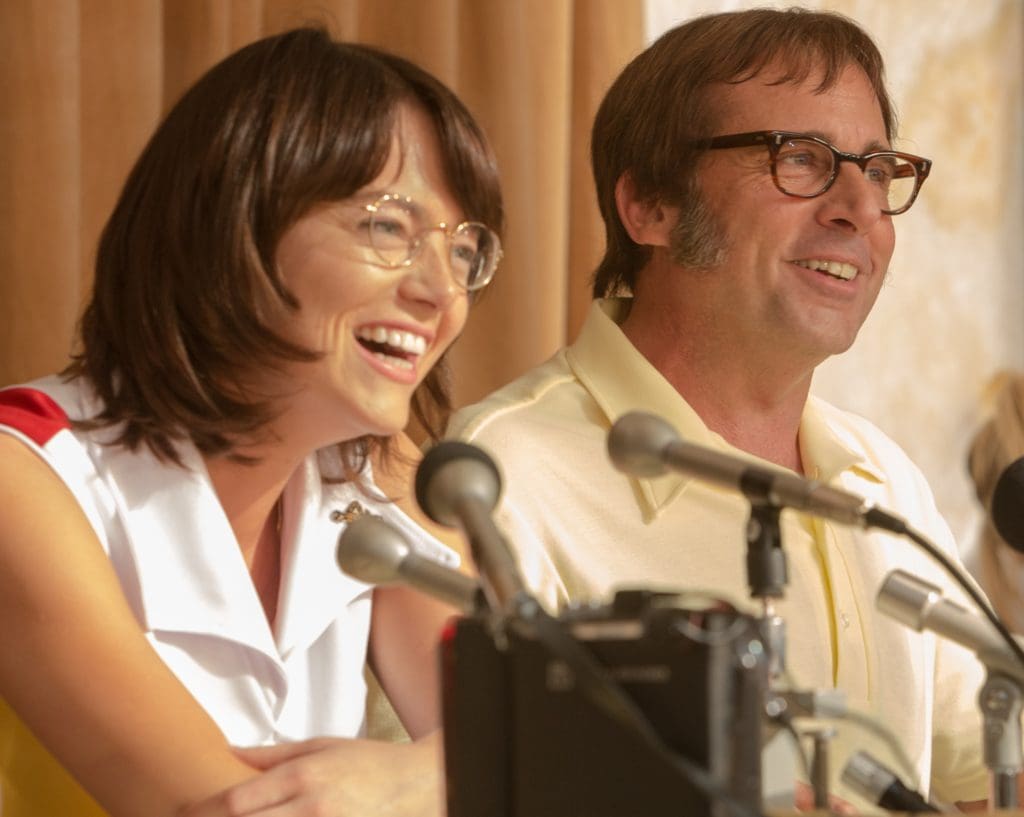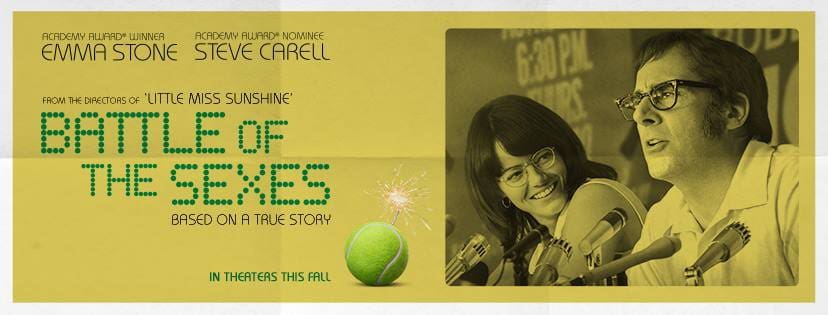Battle of the Sexes Plot Summary:
Based on the true story of tennis superstar Billie Jean King (Emma Stone), who revolts against unfair pay. She ends up forming an all-women’s league, which eventually pits her against Bobby Riggs (Steve Carell), an over the hill former champion who boasts he can beat her in a flashy exhibition match.
I was never a big fan of the title Battle of the Sexes, as it was too on the nose. To be fair though, that’s what the actual match was called, so what can you do. Unfortunately, this movie has the same problems as its title – too on the nose. This was a really disappointing effort, especially in the screenplay department. Simon Beaufoy is the writer here, and it doesn’t surprise me to find 127 Hours and Slumdog Millionaire on his resume, two films I find ridiculously overrated.
Both Beaufoy and directors Jonathan Dayton and Valerie Faris (Little Miss Sunshine) turned out a heavy handed, mediocre movie that’s infused with banal dialogue. Battle of the Sexes is saved somewhat by its two leads, but this could have been one of the best movies of the year if it weren’t plagued by a lot of irritating flaws.
I knew there was trouble in paradise early on. In one of the first scenes, Billie Jean King demands equal pay from Jack Kramer (Bill Pullman), the defacto commissioner of professional tennis in 1972. The dialogue here is embarrassingly on the nose. Kramer and his cohort literally spew out lines about how men are stronger and faster, and it’s just a biological fact. There’s no subtlety here at all.
A great script would have said this in fewer words. Even clever moments get undercut. In this same scene, Sarah Silverman’s character has a great response for these out of date thinkers, but it’s stretched out like a Family Guy joke. It’s that kind of sloppiness that permeates throughout the entire movie.
Not only is dialogue an issue, but pacing and storytelling are a complete mess. The movie is called Battle of the Sexes, but it doesn’t even get to the King/Riggs build up until much later. The first half is focused on King’s romantic entanglement with a hairdresser named Marilyn, played by Andrea Riseborough. While interesting at first, this subplot plays out at a snail’s pace. They mix in some drama with King and her husband, played by Austin Stowell, but it’s not at all compelling.

While Stone and Riseborough have a good chemistry, this shouldn’t have been the focal point. Watching Riggs desperately try and set up this side show of a match is the real meat, but it’s only background dressing in the first half. Whenever the movie focused on King and Marilyn, you wanted to go back to what we actually came for – the Battle of the Sexes. It’s almost like the movie forgot what its original intentions were.
When the film finally locks in on the build up to their match, it gets better. This is where we get to see these great performers show off. There’s not much I can say about Emma Stone here. She’s simply in one of those rhythms where you are guaranteed a great performance. She’s ridiculously likable as Billie Jean King, but the scenes that really hit are when she feels the pressure of what losing this match would mean. They cut out the garbage dialogue and just let Emma Stone go.
Steve Carell is equally as compelling. Bobby Riggs is this sad character behind a mask of humor and jackassery. While a hustler, he’s just trying to be relevant again. Making himself the ultimate male chauvinist pig is the only way he knows how to stay in the limelight. The filmmakers do an efficient job of developing the devolving relationship between him and his wife, played by Elisabeth Shue, as well as the growing concerns his son (Lewis Pullman) has. As far as Carell’s performance goes, he’s as entertaining as ever. He’s funny when he needs to be, but also nails the subtle moments when he feels that relevance slipping away.
As King even references in the movie, Riggs is merely playing a character. The real battle of the sexes is between her and Kramer. Even though they give him bad dialogue, Bill Pullman does a good job of being slimy, but hides it well. Sarah Silverman plays Gladys Heldman, King’s go to manager. Her only purpose is to provide a pithy line here and there. She’s fine at it.
The movie is littered with good bit players, most notably Rosie, another pro tennis player played with a lot of spunk by Natalie Morales. There’s also Alan Cumming and Wallace Langham who play fashion/costume handlers. The performances are good, but they almost come off as Saturday Night Live caricatures. There’s too much winking at the camera with this movie.
There’s a moment right before King goes out to face Bobby where she gets a haircut from Marilyn. The scene is well placed, but you get this back stage guy who reports King isn’t ready yet because she’s getting a trim. It’s one of those moments that takes you out of the movie. It’s the way the actor delivers the line. We understand King getting a haircut before the biggest match of her life is ironic, but they lay it on pretty thick. It doesn’t take the audience seriously.
The movie’s flaw of over explaining itself is even worse at the end. There’s a scene after the match where Billie Jean King sits alone in the locker room. There’s no dialogue. The scene is perfect. Everything is summed up beautifully in this one moment. Nothing else needs to be said, yet the movie feels the need to keep talking. Alan Cumming’s character preaches to King, and he might as well have walked out of the screen to deliver a sermon. It’s the most heavy-handed, over explained message ever. YOU DON’T NEED IT! The great movies speak for themselves. This ending summed up all the issues I had with this film in a nutshell.
If you come into this movie wanting to be entertained by Emma Stone and Steve Carell, you’ll get what you came for. The movie has a powerful message to send about gender equality, but they over explain it, leaving it completely and utterly muddled.
Rating: 6 out of 10 (“Meh”)


